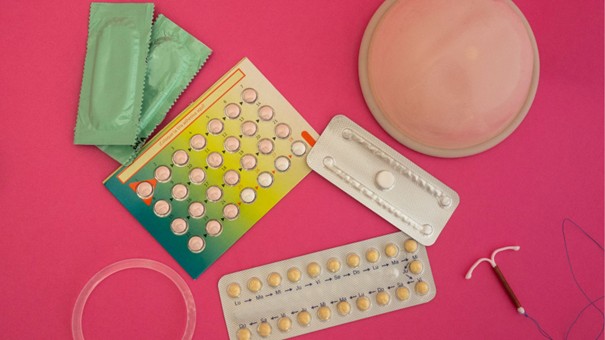
by Dr. Birgit Wogatzky | Oct 7, 2025 | Pill
Contraception: Myths, Facts & Fun Facts – What You Really Need to Know!
Contraception affects us all – but how well do you actually understand it? Did you know, for example, that 85 out of 100 women will become pregnant within a year without using contraception? Or that a condom, according to German industry standards, must withstand 18 litres of air before bursting? 😲
Whether you prefer hormonal contraception, barrier methods, or natural alternatives, there are countless fascinating facts, bizarre historical methods, and persistent myths about birth control. Let’s explore the truths, misconceptions, and some rather unusual contraceptive practices from the past!
Contraception Through the Ages – Some Truly Unusual Methods
For thousands of years, people have been trying to prevent unwanted pregnancies – sometimes using rather questionable methods:
📜 Ancient Times:
✔ Egypt (circa 4000 BC): Women inserted a mixture of honey, sour milk, and soda into the vagina.
✔ Ancient Greece: Some believed that specific sexual positions, magic amulets, or even sneezing after intercourse could prevent pregnancy.
✔ Animal-based barriers: As early as 3000 BC, the first condoms were made from animal intestines or fish bladders.
🎩 19th Century:
✔ Women used vaginal douches after sex to “wash out” sperm – not very effective!
✔ Condoms made from cotton or animal intestines were the most common barrier method.
And today? Thankfully, modern contraception is far more reliable!
Fun Facts: Contraception Like You’ve Never Heard It Before!
😲 Some fascinating and unexpected facts about birth control:
✅ Did you know…
💡 … women who take the pill blink 32% more often on average? The hormone changes can cause drier eyes!
💡 … in Germany, 342 condoms are used every minute?
💡 … Carl Djerassi, the inventor of the contraceptive pill, chose to have a vasectomy?
💡 … frogs were used as pregnancy tests in the 1940s? A woman’s urine was injected into a frog – if the frog produced eggs or sperm within hours, the woman was pregnant! 🐸
How effective are different contraceptive methods?
The Pearl Index is used to measure how reliable a contraceptive method is. The lower the number, the more effective the method. But what does this actually mean?
✔ A Pearl Index of 1 means that out of 100 women using the method for a year, one will become pregnant.
✔ Hormonal methods, such as the pill, hormonal IUD, and contraceptive injection, have a Pearl Index of below 1, making them highly reliable.
✔ Condoms have a Pearl Index of 2 to 12, meaning that up to 12 out of 100 women will become pregnant despite using them.
So, contraception is not always as foolproof as many people assume!
Common Contraception Myths – What’s Really True?
🚫 “Contraception is a woman’s responsibility.”
❌ Wrong! While women have more contraceptive options, birth control should be a shared responsibility in any relationship.
🚫 “You need to take a break from the pill.”
❌ False! Medical studies show that taking a break offers no health benefits – in fact, it increases the risk of an unintended pregnancy.
🚫 “The pill increases the risk of thrombosis.”
✔ That’s right – the pill does come with a range of side effects, and for certain risk factors like smoking or being overweight, one of them is an increased risk of thrombosis. If you’re unsure, it’s best to speak to your doctor.
🚫 “The pill affects fertility after stopping it.”
❌ Incorrect! Fertility usually returns to normal within a few months. However, long-term pill use can lead to a folic acid deficiency, which may increase the risk of miscarriage. Experts often recommend taking folic acid and other key nutrients while using hormonal contraception.
Good to know
Whether you choose hormonal, barrier, or natural methods, every woman has the right to make informed choices about her body. Modern contraception offers many options, but staying informed and supporting your overall health is just as important.
💊 For women using hormonal contraception, supplementing with key micronutrients can be beneficial, as some contraceptive methods increase the body’s need for certain vitamins and minerals.
👉 Resilovit®pill supports your body with essential nutrients and can help compensate for deficiencies caused by hormonal contraception.

by Dr. Birgit Wogatzky | Apr 1, 2025 | Pill
Have you ever wondered how your birth control pill affects your mineral balance? If you use hormonal contraception, it’s essential to support your body in the best way possible – and magnesium plays a key role in this.
Why Magnesium is Essential
Magnesium is more than just a mineral. It’s a true all-rounder, involved in over 300 biochemical processes. It supports muscle and nerve function, maintains a steady heartbeat and healthy blood pressure, strengthens bones and teeth, and helps convert food into energy.
Studies suggest that women who take hormonal contraceptives like the pill often have lower magnesium levels – more on this below.
Magnesium-Rich Foods for Your Health
The best way to ensure a sufficient magnesium intake is through a varied, balanced diet. Some excellent sources of magnesium include:
- Leafy green vegetables: Spinach, kale, and other greens are packed with vitamins and provide a great magnesium boost.
- Nuts & seeds: Almonds, cashews, and sunflower seeds are not only delicious snacks but also excellent sources of magnesium.
- Whole grains & legumes: Wholegrain bread, oats, beans, and lentils offer long-lasting energy and help maintain your mineral balance.
- Fish: Salmon, mackerel, and other oily fish contain both omega-3 fatty acids and magnesium.
- Drinking water: Depending on its mineral content, your tap or bottled water can also contribute to your magnesium intake.
Balance is key: an excessive intake of other minerals – such as calcium, iron, or copper – can hinder magnesium absorption, especially when taken in high-dose supplements.
Recommended Daily Intake and Special Needs
For adults, the recommended daily magnesium intake is generally between 300 and 400 mg. During pregnancy, breastfeeding, high-stress periods, or when taking certain medications, your needs may increase.
A magnesium deficiency can manifest through muscle cramps and twitches, fatigue and sleep disturbances, headaches, irregular heartbeat, and an increased susceptibility to stress and anxiety.
Interesting Fact: Since only about 1% of the body’s magnesium is measurable in the blood, long-term deficiencies often go unnoticed. A magnesium retention test can help detect true deficiencies.
Causes of Magnesium Deficiency
A lack of magnesium can have various causes. Aside from an insufficient intake through diet, the following factors may also contribute:
- Impaired absorption: Digestive disorders like chronic diarrhoea, malabsorption, or intestinal surgery can hinder magnesium absorption.
- Increased excretion: Intense physical activity, excessive sweating, kidney disease, or poorly managed diabetes can lead to higher magnesium loss.
- Medication effects: Certain medications – such as diuretics, antibiotics, and hormonal contraceptives – can disrupt magnesium levels.
Hormonal Contraception and Increased Magnesium Needs
Several studies, including research by Palmery et al. (2013), have shown that taking the pill can impact magnesium metabolism. Women using hormonal contraceptives often have lower magnesium levels, which can disrupt the delicate balance between magnesium and calcium. This imbalance not only affects heart health but can also influence blood clotting.
For this reason, if you’re using hormonal contraception, it’s especially important to ensure adequate magnesium intake – whether through a conscious diet or, if needed, with targeted supplementation, ideally in consultation with your doctor.
Your Path to Better Wellbeing
Magnesium is a crucial mineral that significantly contributes to your overall health and wellbeing. A balanced diet rich in magnesium-containing foods can help you meet your daily needs – and if necessary, professional advice on supplementation can be beneficial.
Look after your magnesium levels!
If you take hormonal contraceptives like the pill, keeping an eye on your magnesium intake is worthwhile. Talk to your doctor or a nutritionist about ways to optimise your levels and enhance your wellbeing – your body will thank you!
Take action now and build a solid foundation for your health!

by Dr. Birgit Wogatzky | Mar 5, 2025 | Pill
The Pill and Its Side Effects: What to Know and How to Support Your Body
The contraceptive pill is a convenient and popular choice – but did you know it affects your body in various ways? Don’t worry, we’re here to explain the most common side effects and share tips on how to keep your body balanced while using hormonal contraception.
1. Minor Symptoms, Major Impact
Many women experience headaches, mood swings, spotting, or breast tenderness. A drop in libido is also common. Sound familiar? These side effects are not unusual and can often be improved with small lifestyle adjustments.
2. Rare but Serious Risks
Did you know that the pill can increase the risk of thrombosis and embolism? This includes deep vein thrombosis, strokes, and heart attacks. Sudden vision problems or high blood pressure could be warning signs – if you notice them, see a doctor immediately!
3. Your Liver is Working Overtime
Since the pill is processed through the liver, it can put extra strain on this vital organ. Over time, this may lead to issues like gallbladder problems or even liver damage. Support your liver by staying hydrated and eating a nutrient-rich diet.
4. Could You Be Lacking Essential Nutrients?
Taking the pill can increase your body’s demand for certain vitamins and minerals – particularly vitamins B6, B9, B12, C, and E, as well as magnesium and zinc. A balanced diet and high-quality supplements can help fill these gaps.
5. Thinking Long Term
Some studies suggest that the pill may slightly raise the risk of certain cancers, such as breast or cervical cancer. On the other hand, it can also reduce the risk of ovarian cancer. The best approach? Talk to your doctor to understand the potential risks and benefits for you.
6. How’s Your Thyroid?
The hormones in the pill can influence thyroid function. If you’re suddenly feeling fatigued or low on energy, it might be worth getting your thyroid levels checked. A healthy thyroid is key to overall wellbeing.
7. What You Can Do
Regular check-ups with your doctor are essential, but there’s also a lot you can do yourself: maintain a balanced diet, stay active, get enough sleep, and manage stress levels. Supporting your body with the right supplements can also make a difference.
Don’t forget to follow us on social media and subscribe to our newsletter – stay informed and make the best choices for your health! 🌸✨

by Dr. Birgit Wogatzky | Oct 25, 2024 | Pill
Why is contraception so often a women’s issue? A look at shared responsibility.
In many partnerships, the issue of contraception is automatically associated with the woman. But why is this? Is it because women have a wide range of contraceptive methods to choose from, while men are limited to condoms or vasectomies? Or is it force of habit? Or is it the consequences of pregnancy that encourage women to take responsibility?
What methods of contraception are available?
The reality is that women have a wider range of contraceptive methods available to them, including hormonal and non-hormonal options such as the pill, the IUD, the condom and more. While some women do well with hormonal methods, others struggle with side effects. This is partly because hormonal contraceptives impact so many different aspects of our bodys and minds, affecting how we feel far beyond their contraceptive effect. It is therefore important to decide which method is best for you.
Is contraception still a woman’s issue?
Historically, women have often had the primary responsibility for contraception, but this dynamic has changed in recent years in many parts of the world.
Nowadays, responsibility for contraception is often a shared decision between partners, and both can be involved in choosing and using contraception.
Data from the Federal Centre for Health Education show that contraceptive behaviour has changed in recent years. More young people are using condoms, leading to a more equal distribution of responsibility. However, women still have more options, which means that they often bear the main responsibility. The fact that there are fewer contraceptive options for men obviously plays a role.
Why are there no better contraceptive methods for men?
One reason is that there has simply not been a lot of investment in research and development of male contraceptives. Although there have been some promising approaches, no really reliable contraceptive methods for men have yet been developed. The condom therefore remains the best option for men to prevent unwanted pregnancy and protect themselves from sexually transmitted diseases.
But contraception is not the sole responsibility of women. It is time to share the responsibility more equally between the sexes. Through open communication and a willingness to learn about different contraceptive methods, couples can work together to find the best solution.
What about you? Share your experiences!



